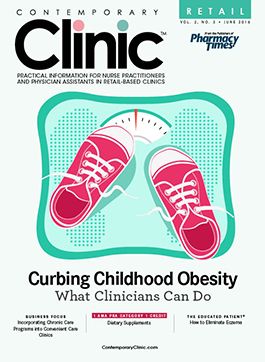Walgreens Healthcare Clinic’s Judy Williams, ARNP, CDE
Praised by her peers for her compassion and dedication, Judy Williams, ARNP, CDE, has demonstrated a profound capacity for patient care both at home and abroad.

Praised by her peers for her compassion and dedication, Judy Williams, ARNP, CDE, has demonstrated a profound capacity for patient care both at home and abroad. Born and raised in Lansing, Michigan, Williams was initially a registered nurse, starting in 1991, before earning her nurse practitioner (NP) certification in 2000. After serving as a certified diabetes educator for more than a decade, she decided to join Walgreens Healthcare Clinic as an NP in 2008—an experience that she has found to be both challenging and rewarding.
“I enjoy the variety and schedule of working at the clinic,” Williams toldContemporary Clinic. “One never knows who will walk through the door with an interesting situation to be resolved.”
However, Williams’ greatest passion lies in her medical mission trips, during which she travels to developing nations to provide health care and other necessitates to those in underserved communities. In fact, her childhood dream to partake in these missions inspired her to pursue a nursing career.
“Since the age of 8, I’ve had the desire to work in missions instilled in me,” Williams explained. “My decision to become a nurse is ultimately an expression of that.”
Williams embarked on her first medical mission in 1985 to India, an experience that proved to be life-changing. There, she saw the health issues that existed in developing nations firsthand, and she came to understand the importance of improving access to health care throughout the world.
“We have so much here in the states and usually take it for granted,” Williams stated. “We live in the top 20% of the world’s wealth and health, but the other 80% of the world has so little.”
Since her trip to India, Williams has lent her skills and knowledge to more than 20 missions across 15 countries, often traveling with a group from her church. Together with her husband, Williams also founded a nonprofit organization, Engage Missions, which is aimed at teaching, coordinating, and raising funds for potential volunteers. Most recently, she travelled to Uganda and South Sudan, where she provided health care, training, and counseling to postwar refugees. Reflecting on those trips, Williams expressed gratitude for the opportunity to bear witness to her patients’ stories.
“Oh, the sad stores we heard from the people telling how the rebels had captured them, the abuse they experienced, and the violence they witnessed. It is amazing that humans can survive such atrocities,” she said. “But they greeted us with smiles and open arms of thankfulness for taking the time to visit their remote village. I always feel more blessed to have gone than for the meager help I have given.”
Q: What do you think is the most important issue in the medical field today? Why?A:Educating the patient is the most important patient-related issue. When patients understand what they have and how to take care of themselves, they leave empowered to become healthy again.
Q: What do you think is the most important quality for a health care provider to possess?A:Compassion is the most important quality when dealing with patients; attitude, actions, and words demonstrate that you care.
Q: What do you find most rewarding about your work at retail clinics?A:The most rewarding part of our retail clinic is the variety of patients seen, from age 18 months to 98 years and counting. Additionally, I have some good coworkers that make employment here all the better.
Q: Is there a particularly interesting or funny story you would like to share from your experience as a clinician?A:A 50-year-old female recently presented at the clinic for a cold. During the exam, I checked her ears and something in her left ear sparkled back through the otoscope. After a quick ear lavage, a diamond was removed! She had no idea how it got there.
Q: What advice would you give to aspiring NPs?A:
1. Time and experience teaches a lot, so don’t give up; things will all come together with a little more time.
2. Love what you do and it won’t seem like work.
3. Keep smiling; your whole countenance cheers up when you smile.

